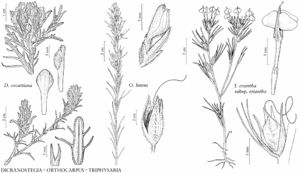Difference between revisions of "Dicranostegia orcuttiana"
Proc. Acad. Nat. Sci. Philadelphia 99: 190. 1947.
FNA>Volume Importer |
FNA>Volume Importer |
||
| Line 15: | Line 15: | ||
|label=Conservation concern | |label=Conservation concern | ||
}} | }} | ||
| − | |basionyms={{Treatment/ID/ | + | |basionyms={{Treatment/ID/Basionym |
|name=Cordylanthus orcuttianus | |name=Cordylanthus orcuttianus | ||
|authority=A. Gray | |authority=A. Gray | ||
| + | |publication_title=Proc. Amer. Acad. Arts | ||
| + | |publication_place=19: 95. 1883 | ||
}} | }} | ||
|synonyms= | |synonyms= | ||
| Line 58: | Line 60: | ||
|publication year=1947 | |publication year=1947 | ||
|special status=Selected by author to be illustrated;Conservation concern | |special status=Selected by author to be illustrated;Conservation concern | ||
| − | |source xml=https://jpend@bitbucket.org/aafc-mbb/fna-data-curation.git/src/ | + | |source xml=https://jpend@bitbucket.org/aafc-mbb/fna-data-curation.git/src/f6b125a955440c0872999024f038d74684f65921/coarse_grained_fna_xml/V17/V17_1231.xml |
|genus=Dicranostegia | |genus=Dicranostegia | ||
|species=Dicranostegia orcuttiana | |species=Dicranostegia orcuttiana | ||
Revision as of 18:27, 24 September 2019
Annuals 10–50 cm, puberulent and hispid to hirsute, hairs white; branches present. Leaves: blade ovate, 2–6(–8) × 3–5 cm, 8–11-lobed. Spikes 2–10 cm; bracts red to maroon distally, oblong-lanceolate, 15–25 mm, 3–7-lobed. Pedicels: bracteole 1, lanceolate to narrowly triangulate pinnate-lobed. Flowers: calyx 6–8 mm, 2-fid, lobes 4–6 mm; corolla 18–25 mm, abaxial lip not spreading, often with purple spots at base, adaxial lip yellow distally; stamens each with 2 pollen sacs widely separated on curved connectives, staminodes sometimes with sterile anthers. Capsules 10–12 mm. Seeds 1–1.5 mm, reticulate, with abaxial crest. 2n = 32.
Phenology: Flowering Mar–Aug.
Habitat: Coastal scrub.
Elevation: 10–400 m.
Distribution
Calif., Mexico (Baja California).
Discussion
Dicranostegia orcuttiana is found along the west coast of Baja California Peninsula, Mexico, and in the flora area in San Diego County, where it is threatened by urbanization.
Selected References
None.
